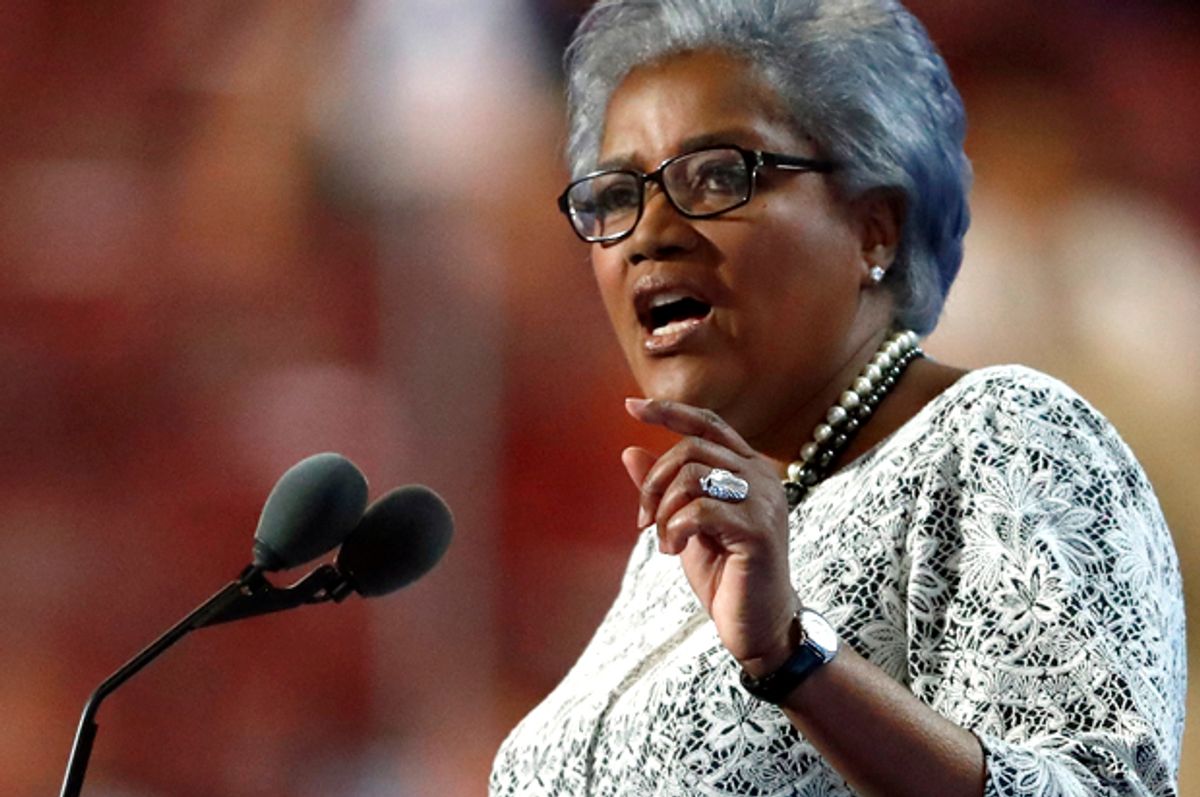This story was initially featured in The Young Turks
When I broke news in October that interim DNC Chair and former CNN contributor Donna Brazile had leaked questions to Hillary Clinton’s campaign ahead of a CNN town hall, the media punditariat went crazy.
Brazile, of course, denied passing off questions, and in the endless sea of WikiLeaks revelations pouring out on a daily basis, the ethical violation got lost in the shuffle of the other eye-openers pouring out of WikiLeaks.
When I challenged Brazile at the third presidential debate in Nevada, she continued to lie about passing off questions, instead foaming at the mouth about Russia’s alleged hacking of the DNC and Clinton campaign chairman John Podesta’s emails.
Five months later, now ex-DNC chair Brazile has come clean, calling her actions something she’ll “forever regret.”
Like most Beltway scandals, the coverup is usually worse than the crime, but in this case, Brazile’s clear assistance to the Clinton campaign while pretending to be a neutral political analyst tells a larger story.
In reality, Brazile passing off questions before town halls and debates isn’t exactly Watergate. Although highly unethical, Clinton and her team already had a rough idea of what questions would be coming their way, so Brazile didn’t exactly put Clinton over the top against Senator Bernie Sanders.
But, her actions are indicative of a much larger problem: the never-ending revolving door between the corporate media and politicians; one that consists of supposed journalists claiming to hold the powerful accountable while simultaneously being in bed with them.
Just look at the current media landscape: pundits on TV offering analysis of political campaigns and movements simultaneously work for Super Pacs or consulting firms supporting candidates; political operatives seamlessly transition from working on campaigns and for politicians to landing heralded columnist roles (John Podesta for The Washington Post) and TV news analyst roles; and anchors and reporters interview political operatives by day and get cozy, off-the-record drinks with them at night.
The Intercept showed this during the campaign, reporting that several TV news pundits had direct financial ties to the Clinton campaign with zero disclosure on air.
This cushy relationship between the media and the powerful exists for one reason—it’s the money Lebowski! TV news, print, and digital breathe access; news executives and journalists are deathly afraid of losing access to politicians and sources, and as a result, largely fluff their pillows during interviews and yack it up with them behind-the-scenes.
I witnessed this for years as a booker and producer at Fox News and MSNBC; journalists who are supposed to have an adversarial relationship with the figures they cover were instead chatting in the green room as if they were BFFs.
Even more startling, while covering the campaign last year at dozens of rallies, I’d see TV news “reporters” yacking it up with campaign advisers in the press “pen,” looking as if they were sharing stories of their old college Keg stand days.
Do reporters have to be openly hostile to the powerful—no, of course not. In journalism, you do have to occasionally kiss a few rings in order to break a big story.
But the problem is the union between corporate media and the powerful is a permanent fixture that contributes to corruption going unreported and real news and injustice lying silent in favor of the infotainment and substance-less drivel the powerful prefers to be covered rather than the special interests they hoard money from.
Which brings us back to Brazile. In fairness, I don’t know Donna Brazile; from people I’ve spoken with about her, she’s a nice woman who has advocated for some progressive policies during her career.
But, when a “neutral” TV news commentator leaks questions to her favored campaign before debates and sends emails to Clinton campaign officials openly cheering them on before debates, it’s indicative of a much larger issue.
Does anyone actually think Brazile is an isolated incident? As I write, there are TV news reporters and pundits, print reporters, and digital executives showing bias and favoritism behind the scenes while playing the part of neutral in public.
As I write, there are commentators and analysts enriching themselves in their day job and then presenting themselves as honest arbiters without a stake in the game in front of the camera.
Ultimately, the victims of this game of make believe is the American public, who turn on their televisions or scroll through newspapers expecting honest and informative news, but instead, are met with half-truths and deceptive commentary coming from figures with ulterior motives.
This is why outlets like The Young Turks are dominating online news, whipping networks like CNN and outlets like The New York Times among millennial viewers.
Who are smart enough to know when they’re being fed BS from journalists who are more interested in access and breaking artificial news than actually holding the powerful accountable.



Shares